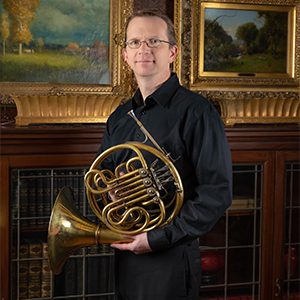
MSO Musician Spotlight: Rudi Heinrich
David Lewellen
PUBLISHED
Tagged Under: Bassoon, MSO Musicians
Rudi Heinrich took up meditation to help him focus onstage, without realizing the world he was stepping into.
Heinrich, the Milwaukee Symphony Orchestra’s assistant principal bassoon, says that despite his professional success, he still struggled sometimes with daydreaming during a performance, so that he might miss a key change or a new time signature. But once he began to practice meditation and study Buddhism, “I realized that there’s a lot more going on here,” he says. “It was something to help you live a better life, a path to understand the universe.”
It wasn’t exactly what he had been looking for. But he has learned to embrace discomfort and to be present with hard feelings, onstage and off. “If I’m on a bike ride and start thinking about the future,” he says, “I can remind myself to be present and enjoy the bike ride.”

“I’m not interested in becoming a monk,” he says. “But I’ve learned to use it as a tool to embrace your best life, and I accept the limits.”
“Rudi is a model colleague and very grounding,” says principal bassoon Catherine Van Handel. “I always feel completely secure when we perform together. It’s not just rhythm or harmony, but the blend of sound. He helps make everyone sound their best.”
Heinrich grew up in Ann Arbor and played the bass clarinet in school, but when the band director needed a bassoonist, “I shrugged and raised my hand.” From starting on the battered old school instrument in the closet, he progressed quickly and attended the University of Michigan in order to continue studying with the same bassoon teacher.
He met his wife, Meaghan, when he was in graduate school at the University of Cincinnati, and for several years they followed each other around the country depending on who had a job opportunity. Today, Meaghan Heinrich is a music teacher in Milwaukee Public Schools and a frequent lecturer before MSO concerts.
They live with their children, now in ninth and seventh grades, in Milwaukee’s Bay View neighborhood. “There were a lot of compromises and sacrifices,” he says, “but Milwaukee is home now and we love it.”
Heinrich won the MSO job in 2013. As assistant principal, he most often plays second bassoon but also moves up to first if Van Handel is absent or needs to lighten her load. “We do a good job of sharing the work,” he said. “Assistant principal jobs are hard because it takes a different mentality to be a leader and to be a follower. But all of your skills stay active.”
The distinction extends to reeds, the famously finicky requirement for oboe and bassoon performance. Heinrich will use different reeds to play high as principal and to play lower on second. “But I almost always use one on the first half (of the concert) and a different one on the second half anyway,” he said. “Catherine will switch in mid-piece sometimes.”
It is impossible to produce good double reeds at industrial scale, Heinrich says, so players make their own from pieces of cane. “Cane is a vegetable,” Heinrich says. “You’re trying to make an instrument out of a vegetable, and they’re all slightly different, just like the produce at the grocery store.”
And people can be as variable as reeds. “I feel like I’ve been in a slump this year,” Heinrich says. “Some bassoonists have an engineering turn of mind and love the machinery, but I don’t fit that category.”
 He does, however, also enjoy tinkering with bicycles. He restored his current main ride, a commuter bike built in the 1990s, and he is working on a similar project with an old road bike. He rides to work unless the weather is cold or snowy. “I’m a frugal Midwesterner. I don’t like to pay for parking or gas,” he says. “Riding keeps my body and mind healthy, and it’s good for the community and the planet.”
He does, however, also enjoy tinkering with bicycles. He restored his current main ride, a commuter bike built in the 1990s, and he is working on a similar project with an old road bike. He rides to work unless the weather is cold or snowy. “I’m a frugal Midwesterner. I don’t like to pay for parking or gas,” he says. “Riding keeps my body and mind healthy, and it’s good for the community and the planet.”
At work, Heinrich says he still gets excited about performing, and even after more than ten years in the MSO, he keeps trying to improve. “I have a chip on my shoulder,” he says. “I think that I’m not tremendously talented. I had to work hard, and I still have to. It’s a process of working and overcoming hurdles, and I embrace the process.”



